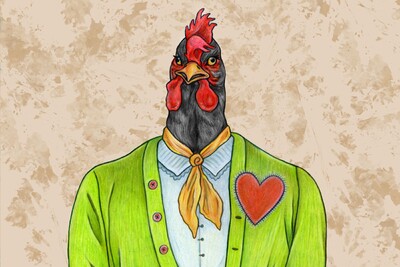We’re waiting to see the veterinarian. I hold Peggy in my lap, wrapped in a towel to keep her calm. An older man sits across from us with his small dog on a leash. He smiles at me and asks, “Who’s that?”
“This is Peggy,” I say, turning her toward him so he can see her fluffy gray face that I’ve left sticking out of the towel.
“Is that—”
“a chicken,” I say with a smile.
The expression on his face is strained. Whatever animal he thought I was holding, it wasn’t something that lived on Old MacDonald’s Farm. We don’t talk again. A few minutes later I see him holding his phone low on his lap, angling it toward us to take a picture.
It’s hard to blame him. Chickens might be the most popular domesticated animal on the planet—there are roughly 25 billion of them alive at any given time—but they don’t often show up in veterinary waiting rooms. They’re birds you can buy roasted for less than five dollars at the grocery store; not ones you spend hundreds of dollars on when they’re sick. Leaning down to pet Peggy, I knew I could have given the man a long list of reasons why he should stop eating chickens. And I knew it wouldn’t work. It’s our capacity for love and empathy that leads to real change: not facts and guilt.
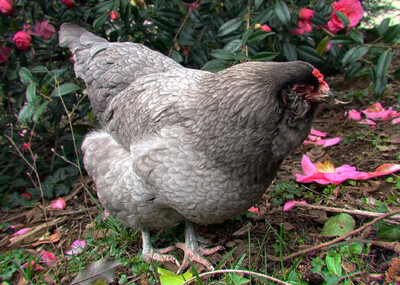
Peggy in her element
all photos courtesy of Tove Danovich
When I got backyard chickens a few years ago, I didn’t intend for them to become pets. I wanted a source of eggs that felt more humane and knew I liked chickens well enough to want to take on the responsibility. Then I got to know them. And then I fell in love.
Chickens are chatty creatures. When I sit in the yard with them, they burble to each other almost nonstop with contented buks and brrips that are check-ins of a sort, “I’m doing good. How are you?” It’s as calming as a cat purring.
If one of the hens gets a tasty worm, she doesn’t eat it in secret but announces it to the rest of the flock with a series of sharp chirps. She runs with the worm dangling from her beak as though daring the other hens to catch it if they can. They’re a world unto themselves with ever-shifting flock friendships and dramas that are as fun to track as an episode of The Real Housewives. One pecks another to start a fight and a third one steps in between them to stop it. They’re curious about everything—what morsels might be hiding in the dirt under their feet, a squirrel that runs too close to the flock, me and what I’m wearing and the possibility that it might be edible. (They like to give my pants or shoes a few pecks to be sure.)
They also grieve.
When chicks are little and separated from the flock, they make a specific kind of peep I always called “the lost chick call.” It’s meant to help their mothers find them if they get separated and is shrill and loud. After my first hen died, killed by one of our dogs, I was heartbroken. Then I heard the remaining two start a version of the lost chick call—bigger and sadder in their adult bodies but unmistakably the same. They knew they’d lost their friend and were trying to call her back to them. Their grief felt the same as mine.
"They’re a world unto themselves with ever-shifting flock friendships and dramas that are as fun to track as an episode of The Real Housewives."
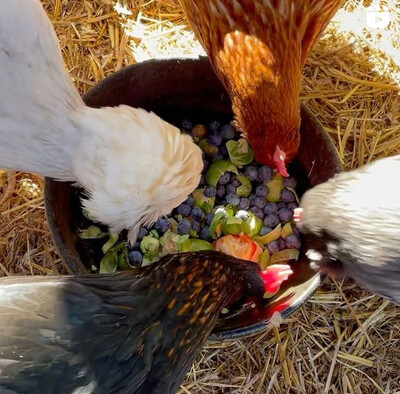
With the lost chick call ringing in my ears, I gave up chicken for good. This choice had been a long time coming; I’d known for a while about the horrifying conditions in which chickens are bred, raised, and killed to provide meat. In the United States, for example, poultry are the only animal exempted from humane slaughter standards that require all other animals be “rendered insensible to pain” before being killed. Broiler chickens raised for meat are such Frankensteinian creatures that they’d die of heart attacks or go lame from the weight of themselves if they weren’t killed for food. I knew all this, but until I knew chickens, every change I made to my eating was temporary.
Looking back, I can see how trying to shame myself into eating less meat was doomed to fail. This strategy, a tangle of shame and perfectionism, often makes me feel like the only way to “eat right” is to do all or nothing. Either I’m eating local or my food was flown in on an airplane. Either I’m a meat eater or I’m vegetarian or vegan or I’m a hypocrite. But I’ve realized that the most meaningful choice I can make about my eating isn’t the perfect one that causes absolutely no harm: It’s the one I can stick to. Which in my case often means the one that inspires me to keep doing more good.
Every day, my chickens help me solidify my decision to eat this way for them—and the longer I’ve done it the easier it’s become. I’m not just thinking about the chickens languishing in farms when I avoid the meat counter, I’m also thinking about the time one of my hens crawled next to me and fell asleep in a snuggle. For me, love is more powerful than guilt.
Making decisions about what to eat based on which of the world’s problems we want to solve first can be exhausting. Maybe we’d be happier if we ate because of something—or a flock of someones—we cared about instead? I needed time to discover that I loved chickens too much to harm any member of their species. It’s why I’m always eager to tell a story about my chickens or let a guest pet them to feel just how soft their feathers are. I want to give everyone the chance to see these birds the way that I do.
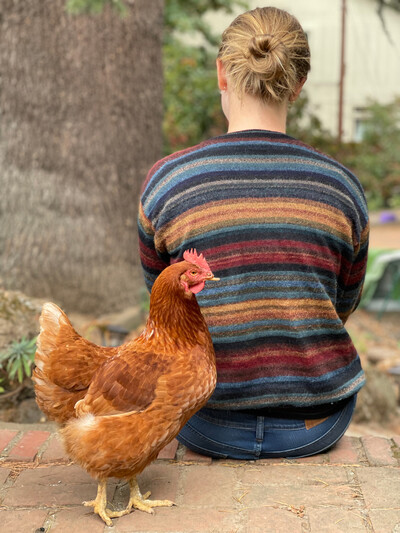
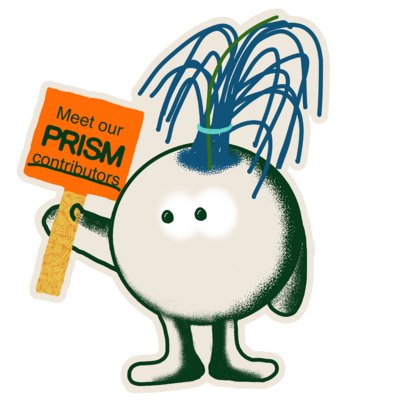
Tove Danovich
Tove is a writer based in Portland, Oregon. Her work has appeared in The New York Times, The Washington Post, Vox, The Ringer, and many others. Her first book, Under the Henfluence, will be published by Agate in Spring 2023.
Prism asks: What is your favorite quote about food?
“He was a brave man that first ate an oyster,” -Jonathan Swift.
Alex Irit Meir
Alex is a graphic designer, illustrator, and professional flower-sniffer from Los Angeles. She is a graduate of CalArts and enjoys drawing, writing, and talking to plants. When not at work, she can be found building terrariums or defeating Sauron.
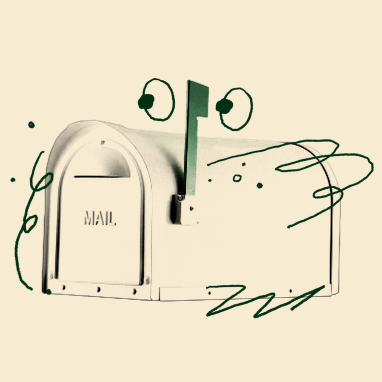
Wellness stories you won’t find anywhere else.
